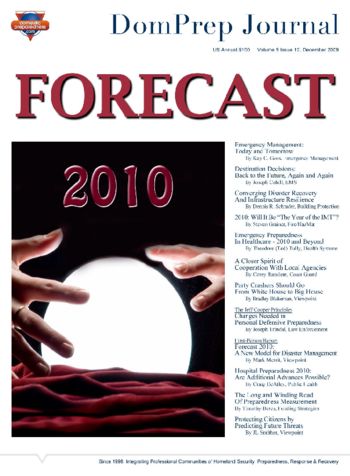

The Jeff Cooper Principles: Changes Needed in Personal Defensive Preparedness
Joseph W. Trindal
December 16, 2009
From time immemorial, and in every society on earth, those who enforce the law have themselves been targeted for death or injury by those who break the law. The attacks against U.S. police and other law-enforcement professionals have become both more frequent and more violent in recent years. Fortunately, there are seven USMC-tested principles for personal survival that can be used to turn the tables on the lawbreakers.

Hospital Preparedness 2010: Are Additional Advances Possible?
Craig DeAtley
December 16, 2009
A greater focus on NIMS objectives seems likely, as well as some HICS modifications. But the possibility of maintaining recent-year funding levels is already very unlikely, and the final version of the healthcare-reform bill, if enacted, has yet to be determined.

First-Person Report – Forecast 2010: A New Model for Disaster Management
Mark Merritt
December 16, 2009
When the moisture level in Iowa climbed several inches, and then several feet, last year, the
residents of the Hawkeye state knew they were in for a very wet summer. The still-ongoing recovery
process from the 2008 drenching required several new approaches, a courageous decision by the governor,
and some very welcome outside help.

2010: Will It Be ‘The Year of the IMT’?
Stephen Grainer
December 9, 2009
Eight years after the 9/11 terrorist attacks U.S. planners say that the nation is now “better” prepared than it was in 2001 – but not yet totally prepared. What they do not say is that total preparedness is a philosophical as well as financial impossibility. Continued improvements are the second best option, therefore, and definitely worth the cost involved.

The Coast Guard Looks Ahead: A Closer Spirit of Cooperation With Local Agencies
Corey Ranslem
December 9, 2009
For many decades the U.S. Coast Guard was the nation’s “”forgotten service”” – except in time of war. In an era when international terrorism is the greatest threat to the U.S. homeland, though, the multi-mission service has moved front and center to a starring role. But it needs help from the private sector.

Emergency Preparedness in Healthcare – 2010 & Beyond
Theodore Tully
December 9, 2009
Emergency planners, political and budget decision makers, and the general public are almost always more focused on preparing for last year’s hurricane than they are concerned about this year’s sudden earthquake, or tsunami, or – much more likely – long-predicted pandemic. Which is why common sense must sometimes take precedence.

Party Crashers Should Go From White House to Big House
Bradley A. Blakeman
December 9, 2009
Allegations, accusations, denials, congressional hearings, alleged cover-ups, and a raft of
unanswered questions. That is the residue (so far) of one of the most publicized and, for practical
purposes, least substantive “news stories of the year.” There are, though, a few “actual facts,” so to
speak, that might also be mentioned. Just as a start.

An Opportunity Beckons: Converging Disaster Recovery and Infrastructure Resilience
Dennis R. Schrader
December 2, 2009
Prevention – of terrorist attacks and/or other mass-casualty incidents – is and must be the first priority in homeland security. But when, not if, prevention fails, as it sometimes will, recovery and resilience move to center stage. The problem is that much has been accomplished in those areas, but much more is still required, and time is running short.

Destination Decisions: Back to the Future, Again and Again
Joseph Cahill
December 2, 2009
Ambulance drivers, EMTs, and other responders may not yet be able to perform brain surgery or heart transplants at the accident scene – but that time might be not too far off, thanks to rapid and continuing advances in medical technology, ultrasound and data-retrieval systems, and other scientific breakthroughs.

